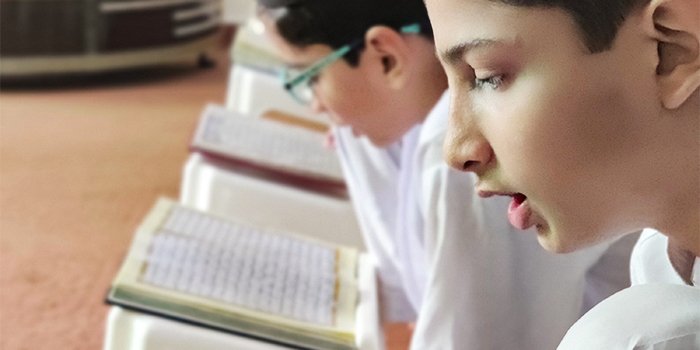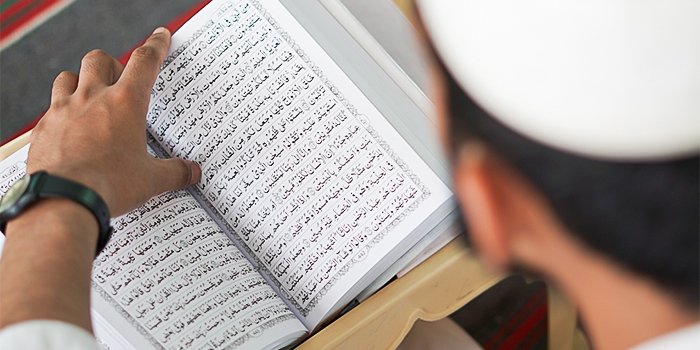When the Heart Feels Heavy
Oct 29, 2025

According to most sources, it typically takes individuals anywhere from 1 to 5 years to memorize the entire Quran.
The Quran is a sacred book for Muslims, considered unlike any other book ever written.
Allah (SWT) states in the Quran:
قُل لَّئِنِ ٱجْتَمَعَتِ ٱلْإِنسُ وَٱلْجِنُّ عَلَىٰٓ أَن يَأْتُوا۟ بِمِثْلِ هَـٰذَا ٱلْقُرْءَانِ لَا يَأْتُونَ بِمِثْلِهِۦ وَلَوْ كَانَ بَعْضُهُمْ لِبَعْضٍۢ ظَهِيرًۭا
Say, ˹O Prophet,˺ “If ˹all˺ humans and jinn were to come together to produce the equivalent of this Quran, they could not produce its equal, no matter how they supported each other.” (Surah Al-Isra: verse 88)
The Quran’s irreplaceable nature and intrinsic holiness come from the fact that it contains the words of Allah (SWT), our All-Knowing and Ever-Merciful God. Scholars and Islamic advocates encourage us to memorize the Quran, as it is the most authentic source of knowledge.
As Muslims, our role is to worship Allah (SWT) and recognize His Oneness through His creations and blessings. What better way to do that than by memorizing the words He revealed to us?

The Quran is undoubtedly the holiest book in Islam. It is the direct word of Allah (SWT), revealed to the Prophet Muhammad (PBUH) in the month of Ramadan. The Quran’s verses aren’t just simple words; they are profound, universal guides for people of any race, color, or ethnicity.
Allah’s words carry more meaning and value than we can imagine. For example, when facing difficulties or when a loved one is dying, we’re encouraged to recite Surah Yaseen. Similarly, when feeling stressed or anxious, reciting Surah Ad-Duha can bring relief.
This Divine Book serves as an antidote for all our problems. Whenever we feel lost or misguided, the Quran offers answers. It also contains prophecies and has been preserved in its entirety, underscoring its unique place in our lives.
Reciting and memorizing the Quran brings mercy and elevates one’s status before Allah (SWT). Our relationship with the Quran is so important that it will intercede for us on the Day of Judgement.
The Prophet (PBUH) said:
“Fasting and the Qur’an intercede for a man. Fasting says, ‘O my Lord, I have kept him away from his food and his passions by day, so accept my intercession for him.’ The Qur’an says, ‘I have kept him away from sleep by night, so accept my intercession for him.’ Then their intercession is accepted.” (Mishkat al-Masabih 1963)
The Prophet (ﷺ) said, “The best among you (Muslims) are those who learn the Qur’an and teach it.” (Sahih al-Bukhari 5027)
Why are we advised to memorize the Quran instead of simply reciting it? What values does it hold?
The art of Quran memorization, or Hifz, has been a long-standing tradition since the Prophet’s time. Back then, literacy rates were low, and oral transmission was the primary way to preserve information. The Quran was initially passed down through oral tradition, with the Prophet reciting to the Sahaba, who then recited to others.
Just as we learn lessons in school through oral instruction, the Quran is also best learned and understood orally. Memorizing it brings endless rewards and blessings.
Many hadiths mention that our final rank in Jannah will depend on the last verse we memorized. Those who learn the entire Quran will be granted the highest level (Riyad as-Salihin 1001).
However, it is essential to understand what you memorize, not just to memorize for the sake of it.

As you begin your journey to memorize the Quran, it’s essential to set realistic expectations. While many people take 1 to 5 years, it may take longer depending on your circumstances. Many of us have other obligations, such as work or family. It’s important not to neglect these responsibilities in the process.
Focusing on consistency over speed will bring more results in the long run. Setting achievable targets will make memorization more manageable. Take time to understand what you are memorizing and apply it in your daily life.
Starting is always the hardest part of any meaningful action. Your initial motivation may be low, but try to overcome that feeling of procrastination. Begin with short Surahs to build confidence. Don’t focus on the fear of forgetting; instead, focus on the reward of trying. Regular revision is key, and remember you are doing this for the sake of Allah (SWT).
Making the right intention for any act of worship is almost as important as the act itself. Establish a clear plan and purpose. Memorize Quran solely to please Allah (SWT), not to show off. Whenever you feel lost, renew your intention and remember your purpose.
A good routine requires an optimal environment. Find a quiet, distraction-free place to focus. The Prophet Muhammad (PBUH) stated that early mornings are the best time for important work. Try to memorize after Fajr or in the early morning.
Consistent memorization requires the help of various techniques. Pronunciation and accuracy are important. Choose a specific reciter and listen to them repeatedly for each Surah. Repeat every page, surah, or verse at least 30-40 times before reciting it by heart. Even after memorizing, review it weekly to ensure you don’t forget.

Incorporate what you’re memorizing into your daily life.
Accountability helps in any task. Join a group or find a partner. This could be a friend, sibling, parent, or someone from the Masjid. Recite to each other for practice and correct pronunciation.
Consistency is the biggest factor in success. It’s not always easy to stay motivated, but small steps make a big difference. Celebrate small wins, like memorizing a short Surah, and track your progress to visualize your journey.
It’s tempting to rush through the pages, but focus on understanding and pronunciation. Islam is a religion that values quality over quantity. Be thorough and don’t worry about how long it takes.
Research shows that creating associations boosts our memory capabilities. Apply this to Quranic memorization by associating verses with imagery. Learning common Arabic words and the meaning of certain verses makes the process easier and much more meaningful.
Today, there are numerous apps, websites, and printed copies of the Quran designed for memorization. Use whatever suits your style. Online communities can also provide support and encouragement.
You’ll often face minor hiccups along the way.
You might:

Memorizing the Quran brings immense rewards:
Narrated Abu Hurairah:
The Prophet (ﷺ) said:
“The one who memorized the Qur’an shall come on the Day of Judgement and (the reward for reciting the Qur’an) says: ‘O Lord! Decorate him.” So he is donned with a crown of nobility. Then it says: “O Lord! Give him more!’ So he is donned with a suit of nobility. Then it says: “O Lord! Be pleased with him.’ So He is pleased with him and says: “Recite and rise up, and be increased in reward with every Ayah (Jami` at-Tirmidhi 2915)
وَلَقَدْ يَسَّرْنَا ٱلْقُرْءَانَ لِلذِّكْرِ فَهَلْ مِن مُّدَّكِرٍۢ
And We have certainly made the Quran easy to remember. So is there anyone who will be mindful? (Surah Al-Qamar: verse 17)
Allah has made the Quran easy to remember, and for those who struggle, He promises even greater reward.
The Messenger of Allah (ﷺ) said,
“The one who is proficient in the recitation of the Qur’an will be with the honourable and obedient scribes (angels) and he who recites the Qur’an and finds it difficult to recite, doing his best to recite it in the best way possible, will have two rewards.” (Riyad as-Salihin 994)
So don’t let your fears and struggles hold you back. Simply try to pursue your goals regardless of the turnout. One of the greatest rewards of being a Muslim is that we get rewarded for simply attempting to be better, not just being better.
Memorizing the Quran is a profound journey that brings countless spiritual, emotional, and intellectual rewards. As we have explored, the Quran is not just a book; it is the direct word of Allah (SWT), a source of guidance, healing, and mercy for all of humanity. The tradition of Hifz is deeply rooted in our faith, offering immense virtues and blessings to those who embark on this path.
Remember, the key to success lies in setting realistic goals, maintaining sincerity in your intentions, and being consistent in your efforts. Utilize repetition, seek support from partners or groups, and make use of modern resources to aid your memorization. Don’t be discouraged by challenges; every struggle in this journey is met with greater reward from Allah (SWT).
No matter your age or background, it is never too late to begin. Start small, celebrate your progress, and focus on understanding as well as memorizing. Let the Quran become a living part of your daily life, bringing you closer to Allah and elevating your status in this world and the Hereafter.
Take the first step today: open the Quran, set your intention, and begin your journey.
May Allah (SWT) grant you ease, perseverance, and success in memorizing His noble words.